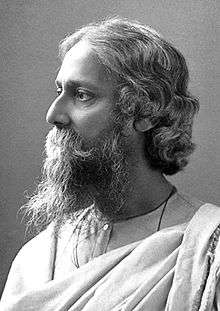Amar Sonar Bangla
| English: My Golden Bengal | |
|---|---|
| Amar Sonar Bangla | |
 | |
|
National anthem of | |
| Lyrics | Rabindranath Tagore, 1905 |
| Music | Gagan Harkara, 1889 |
| Adopted | 1971 |
|
| |
| Music sample | |
| Amar Sonar Bangla (Instrumental) | |
Amar Sonar Bangla (Bengali: আমার সোনার বাংলা, pronounced: [amar ʃonar baŋla] "My Golden Bengal") is the national anthem of Bangladesh.[1][2] An Ode to Mother Bengal, it was written by Bengali polymath Rabindranath Tagore in 1905. The melody of the hymn derived from the Baul singer Gagan Harkara's song "Ami Kothay Pabo Tare" (কোথায় পাবো তারে) set to Dadra Tala[3][4][5]
The word sonar literally means 'made of gold' or 'beloved', but in the song sonar Bangla may be interpreted to either express the preciousness of Bengal or refer to the colour of paddy fields before harvest.
Historical background
The song was written in 1905 during the first partition of Bengal, when the ruling British Empire had an undivided India's province of Bengal split into two parts; the decision was announced on 19 July by the then-Viceroy of India Lord Curzon, taking effect on 16 October. This divide of Bengal, being along communal lines–East Bengal having a majority of Muslims and West Bengal having a majority of Hindus–is claimed to have undermined India's national movement against British imperialism and to have been politically motivated. Along with a host of others, songs such as this were meant to rekindle the unified spirit of Bengal, to raise public consciousness against the communal political divide.
The lyrics first appeared in the September issues of "Bongodorshon" and "Baul" simultaneously, in 1905. The song along with the musical notation (referred to as swaralipi in Bengali), first appeared in the periodical musical journal Shongeet Biggnan Probeshika in the same month and year. Indira Devi, Tagore's niece, Satyendranath Tagore's daughter, jotted down the musical notation hearing it from Tagore himself (this was the common norm, Tagore singing the song, and someone formally jotting down the musical notations).
Lyrics
The following provides the lyrics of the "Amar Sonar Bangla" as written by Rabindranath Tagore.
Only the first ten (10) lines of this song currently constitute the People's Republic of Bangladesh's national anthem are in bold.
Bengali script
আমার সোনার বাংলা, আমি তোমায় ভালোবাসি । |
Bengali romanisation
|
Aamar sonaar baangla, aami tomay bhalobasi. |
English translation
|
My golden Bengal, i love you. |
Official adoption
The first ten (10) lines of this song constitute Bangladesh's national anthem, adopted in 1971 during its liberation war. Only those lines are given in the following section. The instrumental orchestra rendition was composed by Samar Das.[6]
Notable performances and covers
The Ministry of Cultural Affairs planned to stage an event on Bangladesh's 44th independence day, in a bid to have the world record of the most people singing a national anthem simultaneously. Consequently, on 2 March, the ministry launched a program titled "Lakho Konthe Sonar Bangla" whose main objective was to hold an event with the cooperation of Bangladesh Armed Forces where approximately 300,000 people would sing the national anthem.[7] Several popular Bangladeshi musicians and cultural groups later joined the program.[8]
The record was broken at 11:20 on 26 March 2014 by 254,537 participants at Dhaka's National Parade Ground. The event was attended by the Prime Minister of Bangladesh, the Speaker of Jatiyo Shangshad, and all the members of the cabinet.[9] After receiving the required evidence, the Guinness Book of World Records approved the record on 9 April.[10]
See also
- Notuner Gaan, the national march of Bangladesh, written by Kazi Nazrul Islam.
- Ekusher Gaan, a song in the memory of the martyrs of the Bengali language movement
References
- ↑ "The Constitution of the People's Republic of Bangladesh - 4. National anthem, flag and emblem". Ministry of Law, Justice and Parliamentary Affairs.
- ↑ "Bangladesh: Amar Sonar Bangla". NationalAnthems.me. Retrieved 9 August 2011.
- ↑ Folk singer, Swapan Basu, demonstrates the similarity in a live recitation (0:43/8:46 to 1:21/8:46)
- ↑ Chakrabarti, Santosh (2004). Studies in Tagore: Critical Essays. Atlantic Publishers & Dist. p. 108. ISBN 9788126903405.
- ↑ http://tagoreweb.in/Render/ShowContent.aspx?ct=Essays&bi=72EE92F5-BE50-40D7-AE6E-0F7410664DA3&ti=72EE92F5-BE50-4A47-7E6E-0F7410664DA3
- ↑ Komol, Khalid Hasan (2012). "Das, Samar". In Islam, Sirajul; Jamal, Ahmed A. Banglapedia: National Encyclopedia of Bangladesh (Second ed.). Asiatic Society of Bangladesh.
- ↑ "Logo of 'Lakho Konthe Sonar Bangla' unveiled". The Independent. Retrieved 3 June 2014.
- ↑ "Bangladesh prepares for another record". New Age. Retrieved 3 June 2014.
- ↑ "Bangladesh sets world record singing nat'l anthem". New Age. Retrieved 3 June 2014.
- ↑ "Guinness accepts national anthem record". Dhaka Tribune. Retrieved 3 June 2014.
External links
| Wikisource has original text related to this article: |
